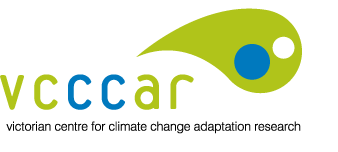Research projects
Adaptation is a social learning process that requires multi-disciplinary collaboration. Researchers work closely with all levels of government, industry and the community to ensure that outputs are relevant and co-learning occurs between researchers and practitioners.
Our research programs aim to:
- Improve government and community understanding about the potential impacts and opportunities of climate change and adaptation options
- Improve government capacity in policy and decision making.
VCCCAR facilitates a number of other activities to facilitate learning and sharing understanding and experiences of adaptation.
- Think Tanks
- Informal conversations on key topics
- An international Visiting Fellowship
- An Annual Forum.
Our current areas of research are:
- Governance, framing and implementation
- Resilient urban systems
- Decision making under uncertainty
- Natural resource management in a changing climate.


